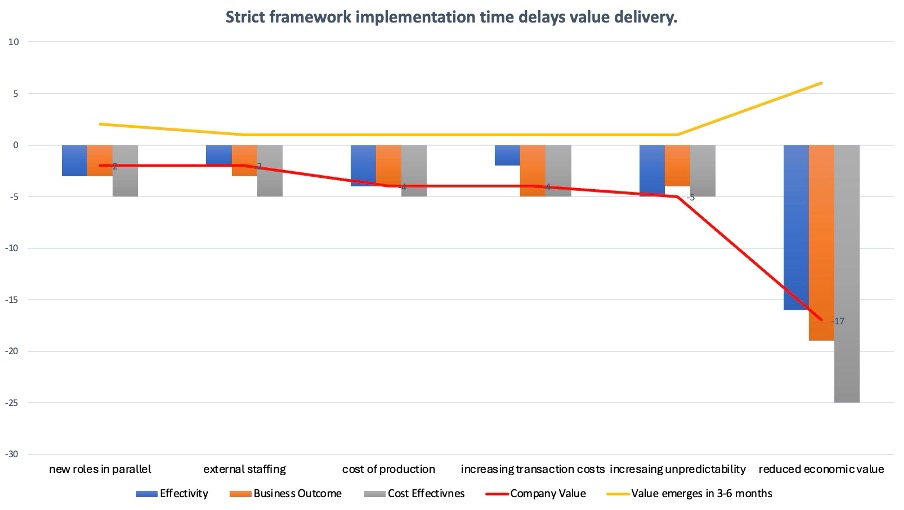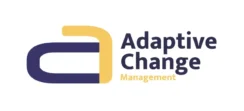The global coronavirus crisis forced businesses to swiftly adapt their operations to protect employees and continue serving their customers and communities. One of the most significant outcomes was an increased focus on a company’s ability to adapt to new conditions. From this, three major practices emerged as critical for survival:
- Strengthening Organisational Culture: Building a resilient company culture that embraces unexpected changes to maintain stability.
- Prioritising Workplace Safety: Ensuring employee well-being to fortify organisational resilience.
- Top-Down Leadership: Using centralised authority to coordinate efforts, develop strategies, and prepare for worst-case scenarios.
Interestingly, the impact of COVID-19 demonstrated that agility frameworks alone are not essential for survival and resilience. Likewise, the traditional change model, viewing transformation as a linear process, was not the key to success.Massive disruptions were not effectively mitigated by agile frameworks, as they are not fundamental to economic survival. Our experience, shared with clients, reveals that the era of lengthy change model implementations is over.

The chart highlights the negative impacts of implementing strict frameworks on value delivery. Effectivity (blue) and Business Outcome (orange) show a decline as changes progress (e.g., external staffing, increasing unpredictability).
The yellow line suggests that value delivery may only emerge after 3–6 months, reflecting delayed returns.
Cost Effectiveness (grey) appears to deteriorate significantly over time.
Company Value (red) steadily drops, particularly as unpredictability and economic value reductions take hold.
Instead, the ability to navigate through organisational structures, clear responsibilities, expertise (kick knowledge), scaling, and hierarchy became the true success factors.
Companies were forced to accelerate decision-making and digitisation in line with the immediate impact of changes.Sociologically, we learned that the structure of a company’s self-concept is the number one survival criterion. This insight informed our consulting approach:
- A) Don’t contradict organisational role descriptions.
- B) Don’t undermine the matrix organisation.
- C) Don’t challenge organisational hierarchies.
- D) Avoid introducing a start-up mentality with a “one right” mindset.
Organisationally and sociologically, we anticipated the importance of rapid, adaptive changes and integrative approaches to managing change. This underscores the need for clarity and stability over rigid frameworks. A key success factor was businesses’ ability to reorganise swiftly (elasticity mechanism) and respond to emerging challenges with quick digital adaptation.
We now know that businesses operate in a world of constant, unpredictable changes. The experience of COVID and new market shifts led to several significant transformations in business operations:
- The need for speed in product and service development is more pressing than ever.
- Focusing on employee engagement to drive enterprise resilience.
- The ability to anticipate problems well ahead of competitors is vital.
- Rapid adoption of e-commerce, automation, and cloud-based technologies.
- Redefining workplace culture to accommodate flexibility while maintaining productivity with digital tools.
Customer-Centric Strategies
- A shift towards digital-first customer engagement and personalised services.
- Increased use of data analytics to understand and meet evolving customer demands.
- Adoption of more flexible organisational structures to respond to fast-changing market conditions.
- A stronger emphasis on adaptability and productivity.
- A broader shift towards flexibility, digital innovation, and employee-centric strategies.
- Rapid anticipation and adaptation to unpredictable changes.
- Transformation through speed, flexibility, and innovation.
- Driving success with employee engagement and business agility.
- Harnessing digital innovation for swift adaptability.
Adaptive Change Management Solutions
These shifts show that business systems are becoming more rationalised, with two main components: productivity and adaptability. Formalisation standardises behaviour across the organisation.
We have developed methods to achieve incorporating fast changes through socioeconomic Kanban & Management for lasting adaptability. Enterprise Services Planning is the first part of the whole concept to create focus. Therefore, managers have to change their habit to transformational leaders. The solution offered by Adaptive Change Management is focused on helping organisations navigate and thrive in dynamic, unpredictable environments by fostering lasting adaptability, elasticity, business agility and resilience. It blends strategy, tactic and operation in an Kanban ecosystem that allow product development businesses to respond swiftly to change while maintaining stability and achieving long-term success.
Tailored Strategies: Adaptive Change Management customises solutions to address the unique needs of each organisation, ensuring that processes, structures, and cultures act as success factors for effectively managing change.
Key elements of the Adaptive Change Management approach include
Socioeconomic Kanban: This approach streamlines workflows, improves decision-making, and reduces transaction costs. It focuses on creating flexible, scalable, and responsive systems that adapt to change while maintaining operational stability.
Tailored Strategies: Adaptive Change Management customises solutions to address the unique needs of each organisation, ensuring that processes, structures, and cultures act as success factors for effectively managing change.
Enhanced Organisational Resilience: By fostering employee engagement and collaboration, Adaptive Change Management strengthens the organisation’s internal structure, enabling it to adapt and thrive in uncertain and fast-changing environments. This includes scaling knowledge work for sustainable impact.
Continuous Improvement: Regular evaluations and feedback loops drive ongoing enhancement of processes, allowing organisations to adapt to market disruptions and improve expert productivity.
Rapid Decision-Making and Digital Transformation: Adaptive Change Management encourages the adoption of digital tools and systems that accelerate decision-making, minimise delays, and enhance overall business agility.
The chart provides insight into operational improvements across four key metrics, highlighting areas where your efforts or initiatives have yielded the most value. Here’s a detailed interpretation:
- Reduction in Administrative Burdens (30%):
This significant improvement indicates that streamlining administrative tasks has had the greatest impact. It may involve automation, better workflow systems, or reduced bureaucracy, directly enhancing productivity and freeing up resources for core activities. - Operational Effectiveness Improvement (20%):
A 20% gain here shows progress in enhancing overall efficiency in processes. This could be attributed to better alignment of operations with business goals, improved training, or the implementation of adaptive strategies like Socioeconomic Kanban to boost effectiveness. - Reduction in Waiting Time (15%):
This moderate improvement reflects efforts to optimise processes that reduce delays, such as faster approvals, reduced idle times, or improved service delivery times. While impactful, this area might still hold further potential for improvement.
Project Cost Reduction (12.5%):
While this metric has the lowest improvement, it is still meaningful. Cost reduction may involve renegotiated contracts, better resource allocation, or optimised project planning. However, the relatively smaller gain could suggest that costs have already been streamlined previously or that further reductions require more strategic interventions
In summary, Adaptive Change Management empowers organisations to address external and internal changes proactively and swiftly, focusing on economic workflows and outcomes. It provides a pragmatic, actionable, and evidence-based approach while ensuring transformational leadership.
The greatest danger in times of
turbulence is not the turbulence―
It is to act with yesterday’s logic.
Peter F. Drucker

Contact Us
We Shape The Future!
valuable. adaptive. innovative.
Our path of cooperation: Building trust, fostering relationships, and delivering value.
Get In Touch
- +43 664 5366975
- +43 3322 43215
- +381 65 6251 806
- [email protected]
Hours
- Mon-Fri 9:00AM - 5:00PM
- Sat 10:00AM - 2:00PM
